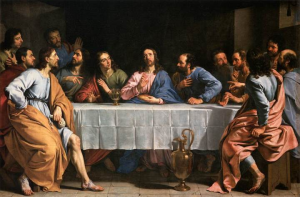HOMILY EASTER SEASON WEEK 06 01 – Year I
Bearing Witness to the Truth
(Acts 16.11-15; Ps 149; Jn 15.26-16.4)
*************************************************
“When Jesus knew that his hour had come to depart from this world and go to the Father.”
 Perhaps you have noticed this sentence has consistently opened the gospel for over a week now during this Easter season, and will continue to do so for the rest of this week. It indicates that what the gospel proclaims is a kind of last will and testament of Jesus, and should be given great attention, as we would to the last words of any dying person.
Perhaps you have noticed this sentence has consistently opened the gospel for over a week now during this Easter season, and will continue to do so for the rest of this week. It indicates that what the gospel proclaims is a kind of last will and testament of Jesus, and should be given great attention, as we would to the last words of any dying person.
The important message today’s gospel imparts to us is we should be ready to bear witness to the truth of our faith in Jesus risen from the dead at any cost.
The truth of our faith, in a nutshell, is God is love and God the Father has raised Jesus, the Son of God, from the dead through the power of the Holy Spirit, and now we are to love one another as Jesus has loved us.
Today’s gospel develops the truth of a relational, Trinitarian God. Jesus tells us he will send us an Advocate, the Paraclete or Spirit of truth, from the Father. Both Jesus and the Father share in the Paraclete’s mission. Ultimately, God is portrayed as the source of the Paraclete’s presence with, and mission to, the believing community. This promise introduces a new function of the Paraclete, “to testify” or “advocate” (“martyreo”). Jesus places the Paraclete in a long line of witnesses that include John the Baptist, the Samaritan woman, Jesus’ words and works, the Scriptures and even God.
According to the New Interpreter’s Bible, the Paraclete is given as an encouragement and a reminder that the disciples will not be alone in their trials. The witness of the Paraclete and of the community are not two distinct acts – rather, the community’s witness is the visible sign of the Paraclete’s work as witness within the community. This highlights a further role of the Paraclete, to speak with and for the community when it is brought before its adversaries (16:1-4a). Here John depicts the world’s hatred and the community’s persecution in more vivid and concrete terms. The refrain, “I have said these things to you,” is to bolster the disciples and their faith in the face of that persecution. They will be able to recognize, with the aid of the Paraclete, that their persecution is in continuity with Jesus’ own ministry and teachings and not an annulment of all that they heard from him.
The expression “put out of the synagogue” occurs here for the first and only time in the mouth of Jesus. While predictions about persecution in all the Gospels are common, John casts them in language mirroring the persecution experienced by his community. “The hour is coming” sets the context for the prediction of martyrdom that follows and conveys a sense of purpose. That hour is the completion of God’s work by Jesus through his passion, death and resurrection. That is the decisive eschatological moment, the time when God’s plan for the world’s salvation is fulfilled. The disciples, by their testimony to this truth, will share his hour with him, with all its eschatological implications.
Bearing witness to the truth of Jesus Christ as Risen Lord will take many forms. For Lydia, who was eager to hear the good news from Paul, it meant providing hospitality. For the psalmist, it means to sing a new song to the Lord, to praise God with dancing and tambourines, to exult in God with joy. This makes one wonder why some are still hesitant to worship God with anything but an organ or piano – certainly not with guitar and drum and dance, as is done in Kenya, and the Eritrean and Philipino communities here!
A more somber response, all too common in today’s world, is persecution of Christians. Some of that, as the gospel states, takes the shape of violence in the name of religion: “Those who kill you will think they are offering worship to God.” That certainly is the case of jihadist and fundamentalist Islamic groups like ISIS who, in the name of Allah, behead those different from them whom they consider infidels.
The Eucharist is our daily manna – God feeding God’s people through word and sacrament. May our celebration today strengthen our faith to testify to the truth of Jesus as Risen Lord, through hospitality like Lydia, exultant praise with the psalmist, and by our lives.



